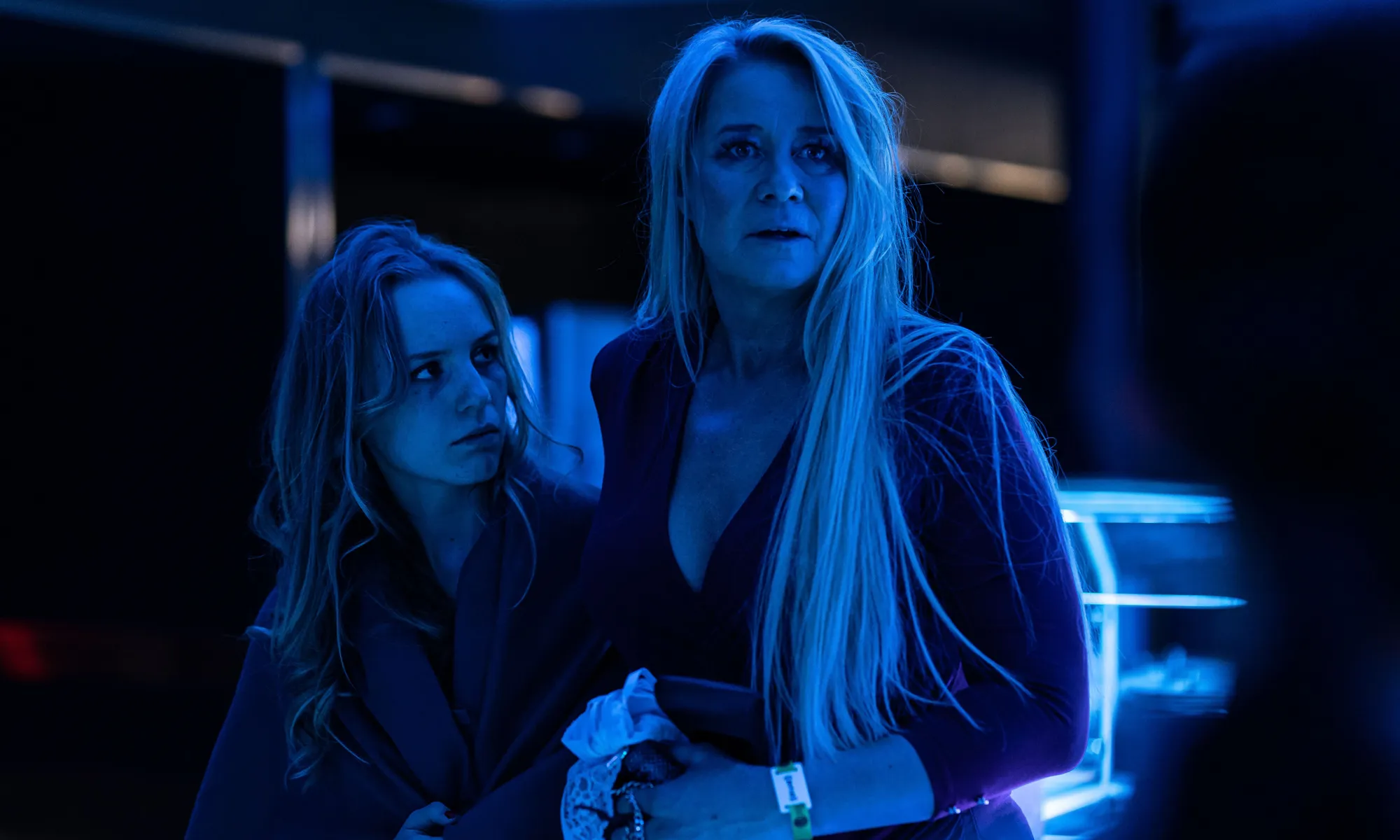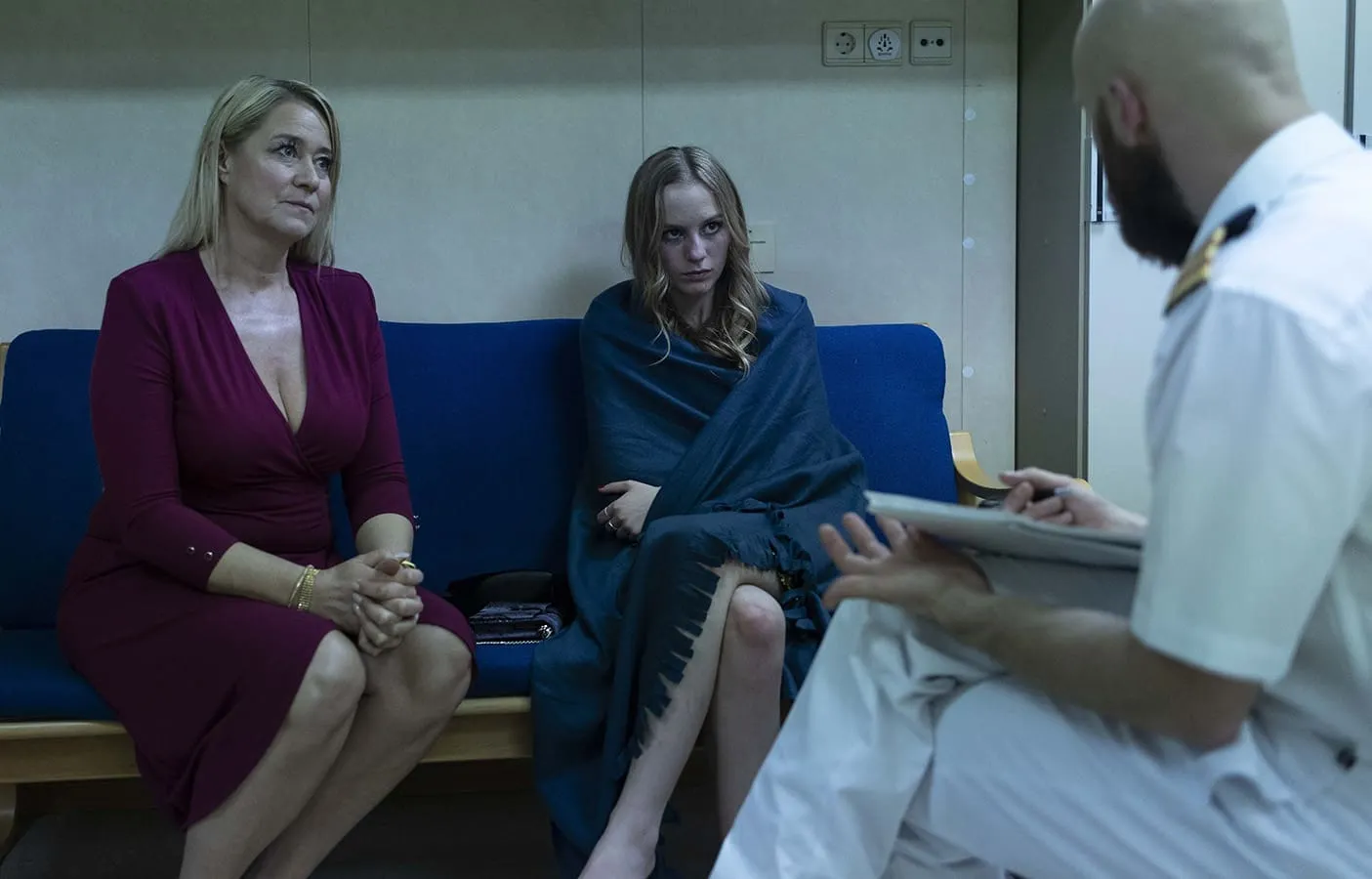A family vacation turns frantic in Birthday Girl, a Danish drama from 2023 directed by Michael Noer. The film centers on Nanna, a mother who treats her estranged teenage daughter Cille to a Caribbean cruise for her 18th birthday, hoping they’ll reconnect after her divorce years before.
But their dream trip takes a sinister turn after Cille’s celebrations one night leave her a victim of assault aboard the ship. As the isolated cruise staff resist responsibility, Nanna becomes the girl’s sole champion in a desperate pursuit of truth aboard the confined vessel that will test the limits of a mother’s love.
Through taut storytelling over the cruise’s tense duration, Noer’s narrative navigates complex themes of justice, trauma, and fractured family bonds under straining circumstances. In a standout lead performance, Trine Dyrholm brings turbulent nuance to the flawed yet devoted Nanna, whose frantic attempts to help her daughter often overstep lines as her distress mounts.
Supported by a believable ensemble including Cille herself, the production milks drama from its crucial cruise setting to keep an emotional edge-of-seat quality throughout a voyage that challenges perceptions of victims, perpetrators, and how far loved ones will go in a crisis with no easy answers. An affecting Scandinavian thriller, Birthday Girl offers much to ponder on protecting the vulnerable and moral dilemmas when systems fail.
Conflicted Connections
Nanna keeps viewers glued as her complexity deepens. A working-class single mom, she prizes appearances yet struggles accepting divorce’s fallout. Eager to bond with rebellious Cille through their cruise and celebrate a milestone, Nanna tries bribing affection through gifts and indulgence. But dismissal of her daughter’s feelings leaves relations rocky.
Witnessing Cille’s torment spins Nanna’s focus fast. Now Mother Bear will raze defenses until justice prevails. Yet desperation breeds lapses—demanding answers yet lacking tact in investigating a trauma. She growls at caretakers instead of nurturing, chasing culprits heedless of consequence. Nanna realizes too late that her actions sometimes compound strains, not ease them.
Flora wonderfully conveys Cille’s turmoil. Still bitter over family unraveling, she receives affection grudgingly and rebels at each misstep. Retreating within, she grapples whether identifying her attacker alleviates pain endured or prolongs it. Her bond with trusted friend, also dragged into darkness, intensifies empathy for all affected by violence.
As crew tasked with passengers’ enjoyment suddenly confronted horror aboard, some staff stonewalled a responsibly ending threat to preserve profits and normalcy, deepening Nanna’s isolation. Others exhibit compassion, assisting women amid uncertainty of international waters jurisdiction. All influenced by crises, characters evolve through hard-won realizations.
Stranded Suspense
Desiring mended bonds, Nanna gifts daughter Cille a cruise for her birthday. But festivities soon sour into terror. Waking hungover, Nanna finds Cille distraught after alleged violation. Yet aboard, the ship provides no justice—international waters detach authorities while crew resist responsibility.
Alone in pursuit of truth, Nanna tenaciously probes the vessel. Director Noer manipulates its confines as a prowling menace, tightening unease through constricted passages Nanna infiltrates against ominous music. Isolated aboard the luxurious titan rendered lethal, victims and perpetrator remain captive to its schedule beyond the law.
The family drama evolves into a thriller amid escalating stakes. Cille retreats into herself while Nanna’s fervor intensifies, yet the narrative thrives on their contrasting trauma experiences, highlighting varied coping. Subplots diversify villains and victims, blurring lines between and compounding an atmosphere of distrust.
Suspicion permeates all aboard—from generic Norwegian admirers to shady crew attempting coverup. No resolution arrives easily as the conclusion challenges preconceptions. Birthday Girl seamlessly interweaves genres to question society’s crisis management, keeping viewers unsettled like its protagonists stranded beyond aid upon the unpredictable sea.
Confined Captivation
Michael Noer skillfully immerses viewers in the tense world of Birthday Girl. From the cruise ship’s first frames as a luxurious floating paradise, his direction transforms the confined vessel into a source of escalating unease. Noer ratchets atmospheric tension through tight close-ups and roaming shots down narrow corridors and up stairwells, following Nanna’s dogged pursuit.
Viewers feel every desperate step as Nanna barges through the ship seeking answers. Withholding reveals until the final reveal, Noer keeps audiences on edge, matching the protagonist’s mounting distress. His steady build of claustrophobic suspense amid lingering shots immerses us in Nanna’s harrowing ordeal.
Cinematographer Adam Wallensten beautifully captures the dual nature of the ship. Bright seas and blue skies seen from Nanna’s early cabins contrast with her darkening perspective. Interior scenes convey an eerie isolation through shadows and sparse lighting as she confronts uncertain fates. Visual poetry enhances the film’s underlying unease.
Adding atmosphere, the soundtrack and sound design amplify the ship’s sinister atmosphere. Swelling strings mirror heightened emotions, while ambient noises emphasize the characters’ confined reality and growing alarm. Subtle audio flourishes deepen Nanna’s jeopardy and fuel viewer investment in Birthday Girl’s most intimate mysteries.
Compelling Conduct
Trine Dyrholm delivers one of the year’s most compelling leads as the distressed yet determined Nanna. Graced with an uncanny ability to inhabit characters, Dyrholm breathes turbulent dimension into the fragmented mother. Watching her progression from carefree celebrant to frantic crusader feels distressingly authentic.
As Nanna’s world unravels, subtleties in Dyrholm’s performance trace her unraveling. Eyes reddening and face aging by the hour, how she carries herself shifts from casual to harried, betrayed vulnerability replacing chipper smiles. Every plea and outburst rings painfully genuine. Dyrholm commands scenes yet crowds dissolve away, so wholly we empathize with her plight.
Flora Hofmann Lindahl effectively plays traumatized Cille’s repression and reluctance, a child staring beyond her years. Shaken reactions to probing ring heartbreakingly true as repressed memories resurface. Their final dance conveys a kinship restored through shared tragedy.
Supporting players, including Maja Thiele, fosters tension amid unfolding mystery. Minor roles like the apathetic captain feel authentically written, complicating facile judgments and fueling debate on individuals’ limits during crises without easy solutions. Together, the cast engrosses us in Birthday Girl’s human drama.
Testing Moral Waters
Birthday Girl packs nuanced insights on trauma’s impacts and providing justice to victims. When authorities deny pursuing Cille’s attacker, the film questions systems failing the vulnerable. Nanna’s desperation highlights the ordeal’s toll and driving need for answers, even as her clouded judgment endsanger her daughter.
Throughout, their complex bond evolves—from rebellion and mistrust to needing each other’s comfort despite past errors. The film sensitively handles mother-daughter rapport’s fragility after divorce disruptions, spotlighting lingering hurts amid rebuilding. Both yearn for reconnecting yet careers Nanna’s crusade test relations, raising delicate discussions on balancing care, protection, and respecting trauma survivors’ autonomy.
Nanna’s moral complexity grips most—her selfless defense of kin clashes with troubling means. Viewers wrestle with condoning law-bending to catch a culprit versus compounding a loved one’s distress. The conclusion arouses a polarized reaction but fittingly offers no easy solutions. Only intimacy between the women offers solace, showing love’s powers to ultimately heal even rifts tested near destruction through shared understanding.
In posing such unsettled issues, Birthday Girl fosters meaningful debate. It sheds light on victims’ diverse responses and obstacles against attaining justice. The film achieves sticking with audiences long after, continuing important conversations on supporting the afflicted while acknowledging life’s nuanced circumstances rarely give straightforward answers.
Enduring Impressions
Birthday Girl delivers a tense, moving watch overall. While its conclusion may divide some, Trine Dyrholm anchors the production with a tenaciously powerful central performance. Supporting actors lend nuanced, believable supporting work that roots the unsettling drama in human reality. Though certain elements feel rushed or overreaching by the film’s end, Noer maintains a prowling air of unease so viewers remain invested in Nanna’s frightening circumstances.
Despite imperfections, the film leaves an impact by addressing sensitive issues unflinchingly. It stimulates discussion on trauma’s impacts and justice’s obstacles when authorities fail victims. Birthday Girl also poignantly handles fractured family dynamics, spotlighting both resignation and resilience in relationships tested near destruction. Visuals further draw viewers straight into the drifting world of a vessel transformed from a carefree escape to a crucible of moral interrogation.
While not flawless, Birthday Girl should be seen for stirring emotive potency and its unblinking perspective on darkness that too often evades attention. Through nuanced characterizations of people pushed to extremes, the suspenseful drama lingers in viewers’ thoughts long after sailing from its screen, continuing an important conversation on supporting survivors through crisis with compassion. It merits appreciation for grappling with complex issues most would rather escape confronting.
The Review
Birthday Girl
In the end, Birthday Girl succeeds in engaging viewers with its emotionally complex drama anchored by outstanding central performances. Though not perfect, director Michael Noer crafts a morally intricate thriller that stimulates discussion on sensitive issues rarely addressed so directly. While certain plot points could have been tighter, the film remains a thought-provoking watch for its unflinching handling of trauma, morality's gray areas, and the resilience of family in desperate times.
PROS
- Compelling central performance by Trine Dyrholm
- Engaging character-driven drama with multilayered themes
- Utilizes confined ship setting effectively to build tension
- Poignant exploration of fractured family dynamics
- Encourages meaningful discussion on handling trauma and justice
CONS
- Ending feels a bit rushed and overreaching.
- Some plot points could have been developed further.
- Potential for certain viewers to lose patience with Nanna's search
- Underuses potentially interesting supporting characters





















































Discussion about this post